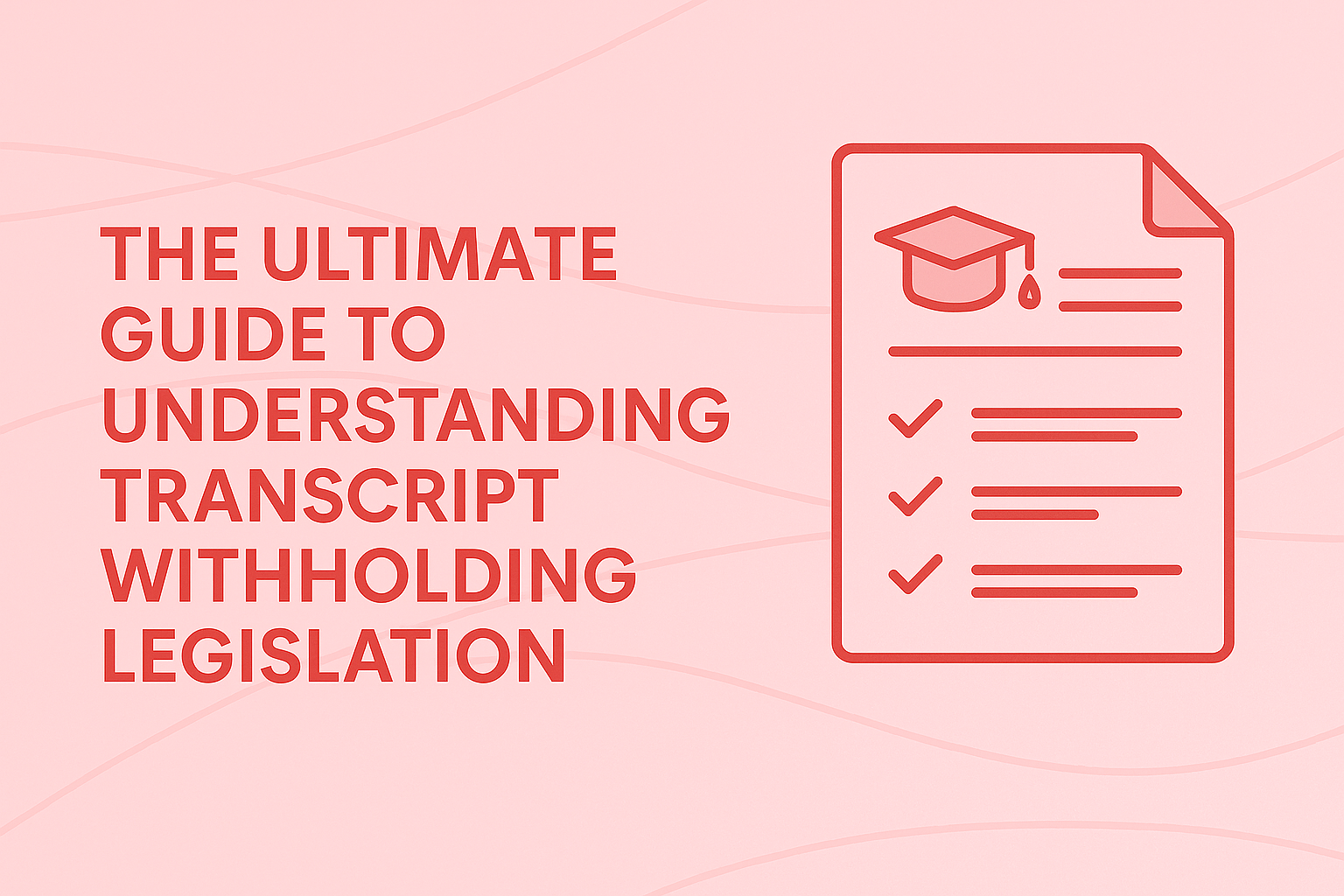The Ultimate Guide to Understanding Transcript Withholding Legislation

As of July 1, 2024, a significant change in student records policy has gone into effect: most forms of transcript withholding due to unpaid student debt are now banned at institutions participating in federal Title IV aid programs. Finalized by the U.S. Department of Education (ED) in October 2023, this rule redefines the conditions under which students can access their official academic records and the limits on how institutions may use transcripts as leverage in debt collection.
This guide provides higher education administrators with a clear overview of the regulation, its implications, and key areas to monitor for compliance.
What the Federal Regulation Requires
Under new Title IV regulations (34 CFR 668.14(b)(33) and (34)), the withholding of official transcripts is now heavily restricted. These rules apply to all Title IV-participating institutions, which includes nearly all accredited U.S. colleges and universities.
Compliance is enforced through:
- Program reviews and audits conducted by ED
- Complaint investigations, including those triggered by student filings
- Institutional reporting and self-monitoring, where schools are expected to proactively address violations
Noncompliance may result in federal enforcement actions, including financial penalties or loss of Title IV eligibility.
When Must a Transcript Be Released?
Institutions must provide an official transcript if any of the following conditions apply:
- The student received Title IV financial aid for the payment period (term) and:
- All institutional charges for that period have been fully paid, or
- The student (or parent) is enrolled in a payment agreement that is in good standing
- The balance resulted from institutional error or misconduct, including:
- Miscalculations or misapplication of aid eligibility
- Title IV return-of-funds processing errors
- Administrative disbursement delays
- Fraud or mismanagement by institutional staff
- The institution is financially at risk or closing, in which case transcripts must be released to facilitate transfers or teach-outs.
In any of these cases, the transcript must be issued even if the student owes other balances for different terms.
So When Can Transcripts Be Withheld?
Transcript withholding is still allowed, but only in limited circumstances:
- The unpaid term did not receive Title IV aid, and:
- Institutional charges for that term remain unpaid, and
- There is no active or compliant payment plan
- Partial-transcript holds may be used cautiously:
- Institutions may withhold grades or credits for specific unpaid, non–Title IV terms
- However, ED has not formally endorsed this practice, and organizations like AACRAO advise that institutions consult legal counsel and apply policies equitably and transparently to avoid disproportionate impacts on students
- Degrees and credentials may be withheld for unpaid balances, but this remains a gray area:
- The federal rule does not explicitly address credential or diploma withholding
- Institutions should exercise caution, particularly when the unpaid balance relates to a Title IV-funded term, as credential holds could invite regulatory or equity concerns
Additionally, state laws may further restrict these practices. States like California, New York, Colorado, and Oregon ban transcript withholding altogether, while others (such as Minnesota and Virginia) impose debt thresholds or special-purpose release requirements (e.g., for employment, military, or transfer).
Retroactive Enforcement
The regulation applies retroactively. Schools must release transcripts under the new rules even when the debt predates the July 1, 2024, effective date — provided the term in question is aid-covered and either fully paid or covered by a compliant payment agreement.
FERPA Considerations
The new regulation does not change FERPA, but institutions should note:
- FERPA provides students the right to inspect and review their education records, but not necessarily to receive copies of transcripts.
- Institutions may still use annotations or placeholder grades (e.g., “GW” for “grade withheld”) for unpaid terms, as long as proper consent is obtained when sharing records externally.
- While partial-transcript holds are not prohibited by FERPA, ED and AACRAO recommend that policies remain consistent and equitable across all student populations, including self-pay, international, and veteran students.
Summary for Institutional Compliance
To stay compliant with the 2024 federal rule, higher ed administrators should:
- Audit and update all transcript hold policies, ensuring they align with federal and state laws
- Ensure systems can differentiate aid-covered from non-aid terms, and track payment agreements accurately
- Coordinate across financial aid, registrar, and bursar offices to enforce rules consistently
- Monitor state-specific regulations, many of which impose stricter limitations than federal requirements
- Be prepared for audits, student complaints, and reviews, with clear documentation of transcript release decisions
The July 2024 federal ban sharply limits when transcripts can be withheld, underscoring the principle that students should not be blocked from their academic records as a collections tactic. While limited exceptions remain, and state rules may go further, institutions should treat transcript holds as a last resort — and ensure that any policies applied are legally defensible, equitable, and transparent.
This guide was compiled using publicly available information, including ED regulations and guidance as well as resources from the American Association of Collegiate Registrars and Admissions Officers (AACRAO). It is for informational purposes only and Meadow is not responsible for any outdated information.
Ready to get started?
Get in touch with our team today.

.avif)

